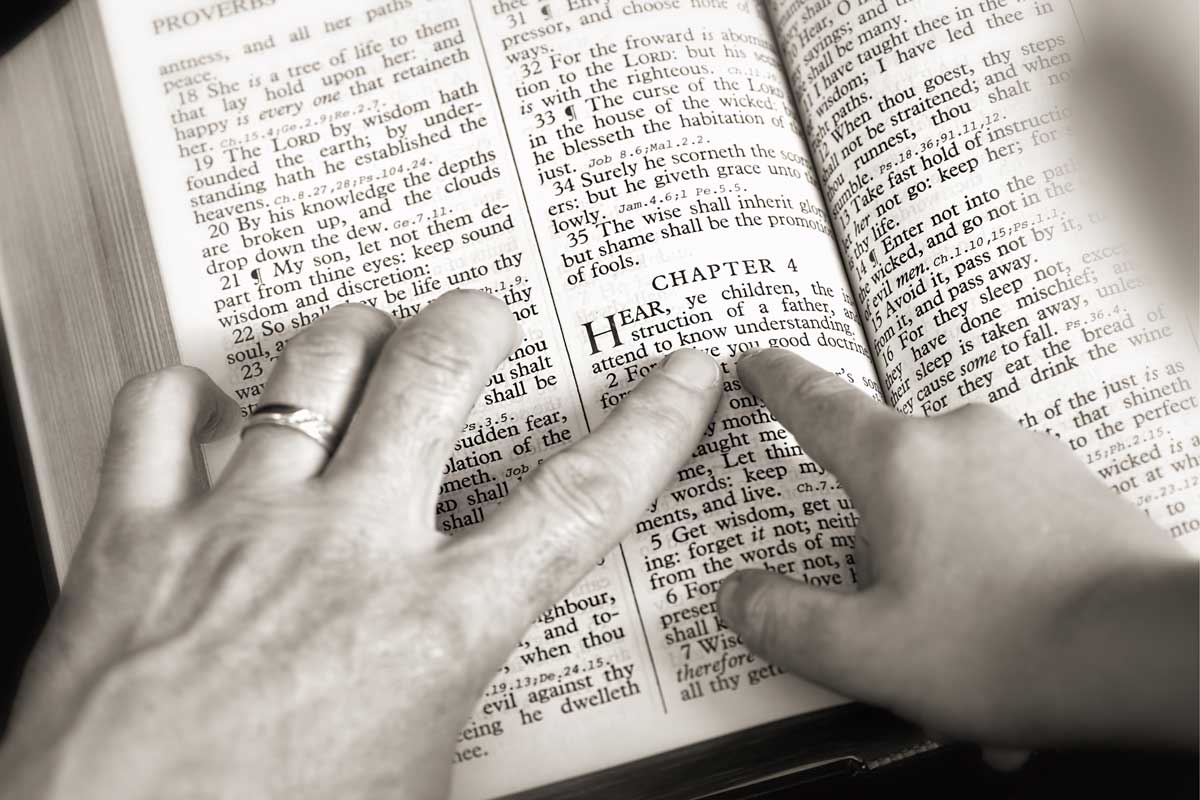Feature
Still Our Ancient Foe
Why Enmity Is Crucial to Peace
Near the middle of The Anti-Christ, Nietzsche mocks Ernst Renan’s life of Jesus for attempting to convince the world that Jesus was a “hero.” Nothing, Nietzsche said, was less evangelical than heroism, for “What the Gospels make instinctive is precisely the reverse of all heroic struggle, of all taste for conflict: the very incapacity for resistance is here converted into something moral: (‘resist not evil!’—the most profound sentence in the Gospels, perhaps the true key to them), to wit, the blessedness of peace, of gentleness, the inability to be an enemy.”
While Nietzsche meant this as an attack on Christianity, many Christians would agree, and see it as one of the chief virtues of Christianity that it deprives men of the ability to be enemies. Liberal theology means many things, but one of its central themes is the denial of enmity, and especially the denial that God has enemies.
On this score, however, “conservative” Evangelicals are often on the same page as liberals. Nowhere is this more evident than in hymnody, always a key barometer of theology and piety. Someone raised on nineteenth-century revival hymns will be surprised by the prominence of enemies in the Psalms, and by the Psalmists’ militant reaction to them. For many Christians, Nietzsche’s description is precisely accurate.
Eliminating the category of enmity from social and political theory has been one of the grand projects of modernity. The liberal political imagination, inspired by Kant’s 1795 treatise on perpetual peace as well as by the British philosophers John Locke and Adam Smith, insists that men act rationally to achieve their own interests. An enemy who seeks to harm even against his own best interests is a surd, a pure irrationality.
Liberalism’s Mission
Liberalism can make no sense of the enemy, and so converts the enemy into something else. The enemy becomes “a competitor” in economics and “a debating adversary” in intellectual matters, noted the German Catholic political theorist Carl Schmitt. Sociology and anthropology re-imagine the enemy as the “outsider” or the “stranger,” as a member of an “out-group,” while postmodern philosophy is obsessed with the “other.”
When liberal modernity has not simply ignored the existence of the enemy, it has denied the existence of enmity that cannot be cajoled, co-opted, convinced, or smilingly coerced into becoming an ally. Economists have offered a “heaven on earth” through rising standards of living or expansion of trade, and this earthly heaven is a heaven of peace: Put a McDonald’s and a Gap in every major Middle Eastern city, and terrorism will drown in a wave of Happy Meals.
Strangely, it is not just abstract theorists who hope for a world without enemies, but supposedly pragmatic politicians, even in the aftermath of the attacks of September 11, the Madrid bombings in March 2004, and the constant terrorist acts in Iraq. In his highly acclaimed little book, Of Paradise and Power, Robert Kagan noted that after World War II, “European strategic culture” set out on a program of “conscious rejection of the European past, a rejection of the evils of European Machtpolitik.”
As Joschka Fischer, Germany’s Foreign Minister, put it, “The core of the concept of Europe after 1945 was and still is a rejection of the European balance-of-power principle and the hegemonic ambitions of individual states that had emerged following the Peace of Westphalia in 1648.” What makes this proposal so attractive is that it has a track record of notable successes. Kagan noted that
it is the integration and taming of Germany that is the great accomplishment of Europe—viewed historically, perhaps the greatest feat of international politics ever achieved. . . . European life during the more than five decades since the end of World War II has been shaped not by the brutal laws of power politics but by the unfolding of a geopolitical fantasy, a miracle of world-historical importance: The German lion has lain down with the French lamb.
This was accomplished through “diplomacy, negotiations, patience, the forging of economic ties, political engagement, the use of inducements rather than sanctions, compromise rather than confrontation, the taking of small steps and tempering ambitions for success.” And this is not to mention the remarkably peaceful dissolution of the Soviet bloc, and more recent efforts to reintegrate the former Communist nations with Western Europe.
Giddy with these achievements, Europeans have taken it as their mission to lead the world into a global, postmodern version of Kant’s perpetual peace. If Germany and France could be cajoled into peace, why not the Palestinian state and Israel, Iraq and Iran, North Korea and South Korea? “The extension of the European miracle to the rest of the world,” Kagan said, “has become Europe’s new civilizing mission.” It is the new “White Man’s Burden.”
Adam & Ajax
To some extent, this theoretical and practical removal of enmity is a product of the gospel and the culture of the gospel that we call Christendom, for the foundation of Christendom was the destruction of ancient enmities. Yet, it simply will not do for Christians to ignore the reality of enmity. Eliminate enemies from the biblical story, and you eliminate most of the biblical story.
You certainly delete the early chapters of the story. As soon as God placed Adam in the garden and gave him a bride to protect, the conditions were set for enmity. And immediately, there was an enemy at the gate— the enemy—seducing and tempting and breathing threats. Enmity arises before the fall, and Adam’s sin can be seen as his inability to recognize an enemy or, more accurately, his refusal to be an enemy.
Enmity intensified after the fall, as God himself told Adam. You cannot read far in the Psalms before you encounter David’s enemies: “O Lord, how my adversaries have increased; many are rising up against me” (Psalm 3); “O Lord, lead me in thy righteousness because of my foes; make thy way straight before me” (Psalm 5); “My eye is wasted away with grief; it has become old because of all my adversaries” (Psalm 6); “Save me from all those who pursue me, and deliver me, lest they tear my soul like a lion” (Psalm 7); and “When my enemies turn back, they stumble and perish before thee” (Psalm 9). And there are still 140 Psalms to go.
Nor is enmity a harsh, Old Testament notion; the New Testament speaks of enemies of the Cross and enemies of Christ and enemies of the Church (Phil. 3:18; Acts 13:10; 2 Thess. 3:15), and no Old Testament passage is quoted more often in the New Testament than Psalm 110, which promises that Christ’s enemies will be subdued beneath his feet.
There are, of course, all kinds of sinful forms of enmity, but far from deleting enmity from history, in fact, Christianity immeasurably and fundamentally deepens it. Nietzsche pointed to this, though in a typically distorted fashion, when he compared the classical notion of “noble adversaries” to the biblical conception of “evil adversaries.” The pagan “desires his enemy for himself, as his mark of distinction; he can endure no other enemy than one in whom there is nothing to despise and very much to honor!”
Ajax and Hector fight to a standoff on the windy plains of Troy, and then remove their armor and exchange gifts to formalize a friendship. Plutarch’s treatise on “How to Profit by One’s Enemy” breathes a similar spirit, though in a more philosophical idiom.
Classical enmity was functional, strategic, temporary, and superficial. For ancient heroes, enmity always played out under a canopy of basic agreement; battles were fought under the aegis of a code of honor to which both sides adhered, but there was no battle over the code. Political enemies in Athens struggled for supremacy, but all accepted the principles of democracy that ordered the city.
Only Battle
Christianity and postmodernism agree in this: No such universal canopy exists.
As a result, for the Christian, there can be no compromise with the enemy, but only battle until victory. Can anyone imagine Moses combating Pharaoh through eight plagues, and then calling it all off and moving back into Pharaoh’s palace? Can anyone imagine David and Goliath fighting to a draw, and then going off to share a pint? We might as well imagine Jesus dining with the devil after his temptations in the wilderness. Pagans were happy to incorporate any new god into the Pantheon, including Jesus, but Paul asks, What harmony has Christ with Belial?
Few writers have perceived the importance of this “battle for and against enmity” more clearly than Carl Schmitt, a Nazi apologist who has ironically become a popular writer in some leftist circles in recent years. For Schmitt, the political realm is defined by the opposition of friend and enemy, just as the aesthetic realm is structured by the opposition of the beautiful and the ugly, and the moral realm by the opposition of good and evil.
Schmitt’s emphasis on enmity grew out of explicitly theological assumptions. Recognizing that Satan is the great adversary for Christians, Schmitt pointed out that Satan is a master of deception and disguise, and the greatest deception must be the promise of the end of enmity. In The Lesson of Carl Schmitt, Heinrich Meier summarizes Schmitt’s position as follows:
How could the Old Enemy prepare his victory more cunningly than by making men forget the enmity that is sown between him and them, and how would such forgetting be brought about with greater prospects of success than through the promotion of the errant faith that they no longer had any enemies or that without exception they are well on their way of getting rid of them? How could he disguise himself more perfectly than by disavowing enmity and proclaiming its conquest?
This temptation, the modern liberal temptation, must be resisted as strenuously as any temptation, because “whoever wants to withstand Satan must insist on enmity.” The battle for or against enmity is “the political-theological criterion of the highest order.” Strange as it sounds to Christian ears, we must stand for enmity and against all theoretical and practical projects to eliminate it. Those who wish to eliminate enmity are our enemies.
All projects, of course, but one. If Kant, Smith, Locke, and the other founders of liberal international order pursue a secular elimination of enmity, postmoderns inspired by Schmitt and others insist on enmity without hope of victory or reconciliation. Neither of these is a Christian option, for the Church proclaims a gospel that announces the breaking down of the dividing wall and of enmity between Jew and Gentile.
The Enemy Destroyed
Crucially, this project is not based on détente, on negotiations, or on diplomacy. The wall of enmity is destroyed because the enemy is destroyed. Now is this world judged. Now is the prince of this world cast out. With Kant and all moderns, Christians look forward with hope to the end of enmity. Against them, we look to the end of enmity ultimately through the truly paradoxical victory of the Cross.
Equally crucial is the fact that this destruction of enmity takes place through the Cross. Lee Harris has recently written a fascinating book, Civilization and Its Enemies, about the enemies of civilization that threaten America and the West. He points out that civilization depends on the renunciation of ruthless violence, and the determination to resolve disputes without recourse to war. Civilization simply is the order that results from this renunciation, and from the trust that others have made the same commitment.
And it works: We put our money in a bank run by total strangers, and still find it there a month later. We take our car to the mechanic, and he doesn’t make off with it. I can go to the barber for a shave, confident that he won’t cut my throat. But, Harris argued, this renunciation of violence puts civilized societies at a disadvantage, because ruthless people remain at large, people who will stop at nothing, even death, to destroy civilization.
To the extent that civilized societies are truly civilized—that is, truly based on a renunciation of violence—to that extent they tend to forget that not everyone is so civilized. The only way that civilization can survive, it seems, is through preserving pockets of ruthlessness for its own defense. Civilized society thus paradoxically depends on the very ruthlessness it fundamentally renounces.
There is a great deal of truth to Harris’s argument. But the paradox that he isolates is only paradoxical within the liberal internationalism that he examines, that is, only if one begins with the assumption that all violence is ruthlessness, only if one believes that civilization depends on the renunciation of all uses of violence, and only if one believes that there can be no moral use of violence. None of these assumptions is acceptable in the Christian tradition.
Abolishing Enmity
In the Christian just-war theory, war can be an act of justice and even mercy. In the Christian tradition, war is ruthless in the sense that it aims at victory, but not ruthless in the sense of being amoral. Civilizations can be and have been founded on an absolute ruthlessness, and some have even aimed their ruthlessness at the elimination of enmity. One thinks of Augustine’s assessment of Roman peace and security as libido dominandi writ large. Just-war theory, however, is modest. It is about the limitation of enmity, not its elimination.
War might defeat an enemy, but it does not defeat enmity. So long as the lion has not lain down with the lamb, war remains a Christian option, sometimes a Christian duty. But even the most morally defensible uses of violence are, at best, strong walls that provide time for the Church to proclaim and practice the Cross.
Given the inevitability of enmity, there are, in the end, only two ethical and political options, apart from sheer resignation, which is not an ethic that can guide a civilization and not a politics at all. Enmity will be “eliminated” by an absolute, totalitarian ruthlessness, or enmity will be overcome through martyrdom. Just as Jesus “abolished in his flesh” enmity on the Cross, so Christians are called, in union with him, to offer their bodies as living sacrifices to abolish enmity.
The way of the Cross is the way of the martyr, and it is the only politics of ultimate peace, the only way of establishing the kind of life that is worth defending against enemies, and the only way of life that approximates the eschatological elimination of enmity. It is the way laid out by Paul:
Never pay back evil for evil to anyone. If possible, as much as it depends on you, be at peace with all men. Never take your own revenge, beloved, but leave room for the wrath of God, for it is written, Vengeance is mine, I will repay, says the Lord. But if your enemy is hungry, feed him; and if he is thirsty, give him a drink; for in so doing you will heap burning coals upon his head. Do not be overcome by evil, but overcome evil with good.
Peter J. Leithart is an ordained minister in the Presbyterian Church in America and the president of Trinity House Institute for Biblical, Liturgical & Cultural Studies in Birmingham, Alabama. His many books include Defending Constantine (InterVarsity), Between Babel and Beast (Cascade), and, most recently, Gratitude: An Intellectual History (Baylor University Press). His weblog can be found at www.leithart.com. He is a contributing editor of Touchstone.
subscription options
Order
Print/Online Subscription

Get six issues (one year) of Touchstone PLUS full online access including pdf downloads for only $39.95. That's only $3.34 per month!
Order
Online Only
Subscription

Get a one-year full-access subscription to the Touchstone online archives for only $19.95. That's only $1.66 per month!
bulk subscriptions
Order Touchstone subscriptions in bulk and save $10 per sub! Each subscription includes 6 issues of Touchstone plus full online access to touchstonemag.com—including archives, videos, and pdf downloads of recent issues for only $29.95 each! Great for churches or study groups.
Transactions will be processed on a secure server.
more from the online archives
calling all readers
Please Donate
"There are magazines worth reading but few worth saving . . . Touchstone is just such a magazine."
—Alice von Hildebrand
"Here we do not concede one square millimeter of territory to falsehood, folly, contemporary sentimentality, or fashion. We speak the truth, and let God be our judge. . . . Touchstone is the one committedly Christian conservative journal."
—Anthony Esolen, Touchstone senior editor









